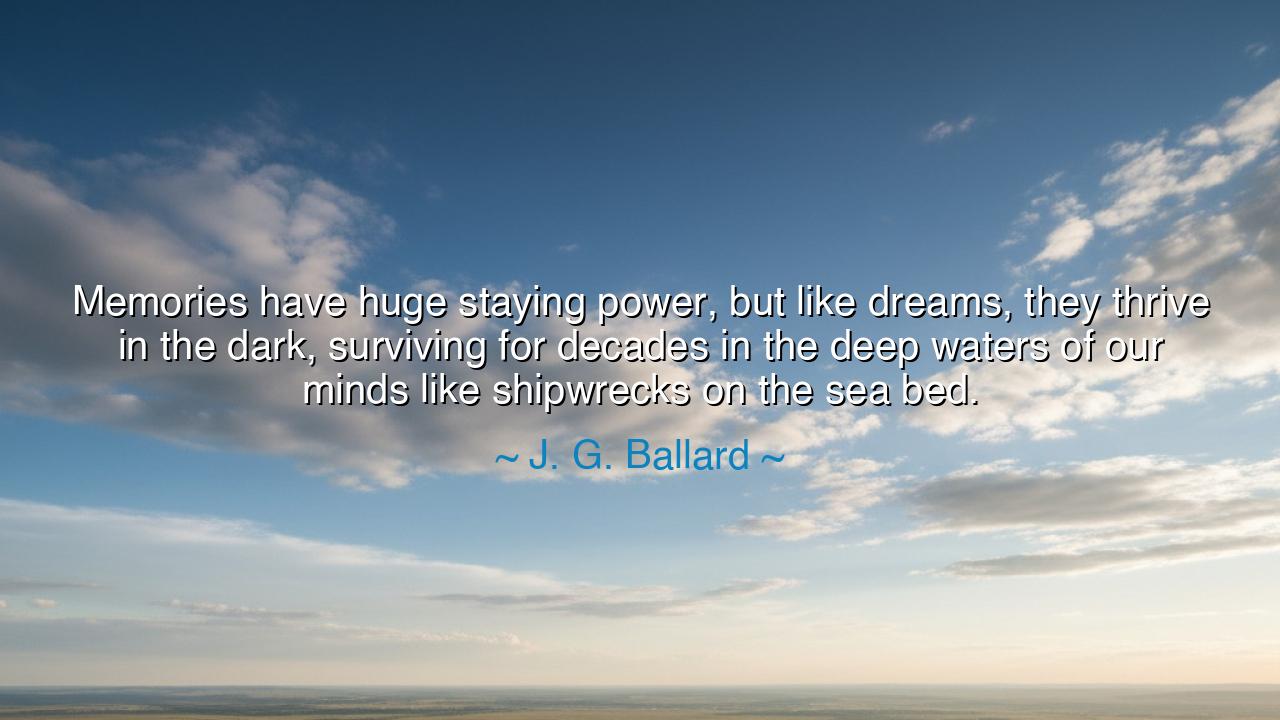
Memories have huge staying power, but like dreams, they thrive in
Memories have huge staying power, but like dreams, they thrive in the dark, surviving for decades in the deep waters of our minds like shipwrecks on the sea bed.






When J. G. Ballard wrote, “Memories have huge staying power, but like dreams, they thrive in the dark, surviving for decades in the deep waters of our minds like shipwrecks on the sea bed,” he was speaking as a man who had wandered long through the depths of the human psyche. Ballard — whose life was scarred by war and solitude — understood that the mind is not a clear, sunlit field, but an ocean full of wreckage and wonder. His words are not simply about recollection, but about the mysterious and haunting power of memory, which endures beneath the surface of consciousness, shaping us even when we do not see it.
Born in Shanghai and imprisoned during World War II as a child, Ballard saw early the chaos of civilization stripped bare. His writing — often called surreal, psychological, and prophetic — explored the hidden landscapes of the human soul: the zones where memory, trauma, and imagination merge. When he speaks of memories as “shipwrecks on the sea bed,” he invokes the image of a vast, silent ocean — the unconscious mind — where fragments of our past sink, preserved in darkness. They rest there, forgotten by the waking mind, but never gone. Like ancient wrecks, they wait in the cold depths, intact yet unseen, until some current of emotion or chance of circumstance brings them back to light.
To say that memories thrive in the dark is to reveal a paradox. The more we try to bury the past, the stronger it becomes beneath the surface. The mind’s darkness — that hidden realm where reason does not rule — is the soil from which dreams and memories grow. Just as a dream is not a lie but a vision born of buried truth, so too the memories we repress live on, transforming in shadow. When Ballard speaks of them “surviving for decades,” he teaches that time does not heal all wounds — it only buries them deeper. But even buried things breathe, and one day the sea of the mind returns them to shore.
History offers countless examples of this truth. Consider Marcel Proust, whose monumental work In Search of Lost Time was born from a single moment of memory — the taste of a madeleine dipped in tea. That small, forgotten sensation opened the floodgates of remembrance and revealed to him the architecture of an entire life. What Ballard describes as “shipwrecks” are these same hidden treasures — the fragments of self that memory guards in silence, waiting for the day when feeling, scent, or sound awakens them. And when they return, they do not come as mere recollections — they come as revelations, reshaping how we understand ourselves.
Yet Ballard’s image is not gentle; it carries a warning. Memories can preserve beauty, but they can also preserve pain. Like shipwrecks, they are often the remnants of catastrophe. They remind us that beneath our calm exterior lies a sea of old storms — of love lost, of guilt unspoken, of fear endured. To explore that sea is to risk being pulled under, but to ignore it is to live shallowly, forever afraid of what lies below. The wise learn to dive carefully into those depths, not to dwell there, but to recover what truth they can. For no one can be whole who fears their own darkness.
Thus, Ballard calls us to a kind of courageous introspection — to make our memories “objects of daily consideration,” as Jung once said of dreams. We must learn to look upon the wrecks of our past not with shame or fear, but with understanding. For in those submerged ruins lies the map of our becoming — the record of every loss that taught us compassion, every mistake that sharpened our wisdom, every joy that taught us love’s fragility. When we dare to explore that inner sea, we begin to see that even pain, when remembered rightly, becomes a teacher.
And so, let this teaching be your anchor: do not flee from your memories, nor try to bleach them in the false sunlight of denial. Let them rest where they belong, in the depths, but visit them with reverence. Listen to what they whisper from beneath the waves. They will remind you who you were, and in that reflection, who you still might be. For as Ballard teaches, the soul’s past is not dead — it is merely submerged. And the one who dares to dive will find, amid the wreckage, the hidden treasures of wisdom, sorrow, and truth.






AAdministratorAdministrator
Welcome, honored guests. Please leave a comment, we will respond soon